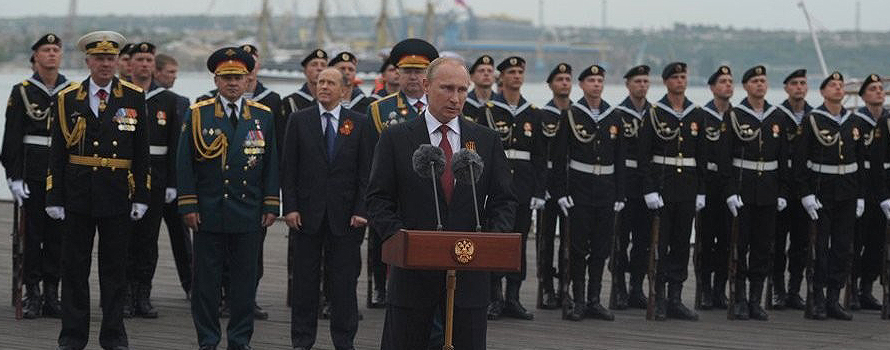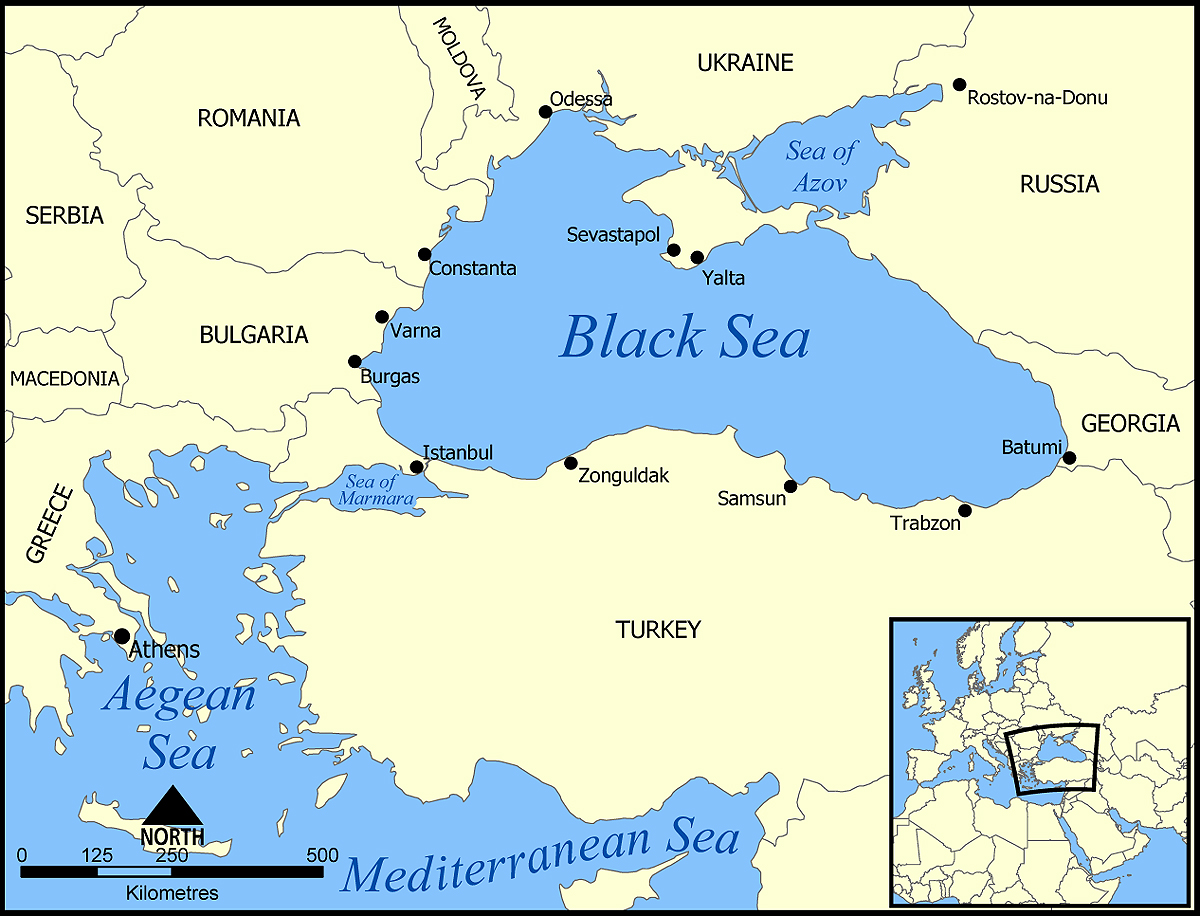Moscow continues militarization of the peninsula to prevent other forces from entering the region
Since the turn of the century, Russia had been losing economic, political and military influence in several Black Sea littoral countries; the seizure of Crimea attempted to correct the status. The Kremlin has just deployed a new missile group on the peninsula, in the framework of a long-term rearmament program deadline that seeks to ensure that operationally the Black Sea is a Russian 'lake'.

▲Putin in Sevastopol during the 2014 celebration of the victory in World War II [Kremlin].
article / Vitaliy Stepanyuk
"The bear will not ask anyone's permission." This was the allegory used by Russian President Vladimir Putin, at a Valdai Discussion Club meeting in October 2014, to reflect that Russia will not seek anyone's permission when pursuing its national interests and those of its people.
These words were pronounced a few months after the Russian annexation of the Crimean peninsula. The process of change of government had been initiated and troops had been mobilized to the newly incorporated territory, making any subject Ukrainian intervention to regain their land impossible. Approximately four years later, the militarization of the peninsula continues its course by the Russian Federation.
Thus, the deployment of a new defense system in Crimea has just become known, an action justified by Moscow as a measure to protect the airspace over the Russian-Ukrainian border, and also to deal with continued threatening activity on the border, arising mainly from the presence of NATO.
Since the occupation of Crimea, the Kremlin has initiated a long-term rearmament program deadline to achieve a zone (A2/AD) that would prevent other forces from accessing the region. This zone would limit the freedom of both air and ground maneuver for potential invaders. Together with other missile systems in Armenia, Krasnodar and elsewhere, this establishes a truly comprehensive anti-access zone. The establishment of advanced defense systems, the update of radars, the modernization of the Black Sea Fleet and the deployment of fighter aircraft are some of the initiatives undertaken to create such a blockade zone against any outside advance. In the coming years, six new attack submarines and six new surface ships are planned to be added to that Fleet, which could operate beyond the Black Sea, even supporting military operations in Syria.
Moving away from the old satellites
The increase in NATO troops and their presence in countries bordering Russia is seen by Russia as a threat to its security. Countries such as Poland, where NATO mobilized in January 2017 about 3.500 soldiers, and others such as Estonia, Latvia, Lithuania, Romania, Bulgaria and Hungary see the deployment as necessary in view of the status occurred in Ukraine and Russian military exercises near their borders: a clear example is Zapad 2017, a set of strategic and military exercises carried out jointly by Russian and Belarusian troops, in Belarus, in the Kaliningrad Oblast and along the entire northern strip bordering NATO countries.
|

Map from Wikimedia Commons
|
Looking back over the recent history of the last 20 years, we can see how Russia has been losing economic, political and military influence over the territories bordering the Black Sea since the beginning of the century. Thus, in Georgia (2004) and Ukraine (2005), more pro-Russian presidents were replaced by more pro-Western ones. In addition, Bulgaria and Romania had become members of NATO, while Georgia and Ukraine were working on it.
Operations in the Black Sea area
Threatened by this status, Russia decided to do everything possible to prevent Georgia and Ukraine from becoming NATO members, while at the same time developing strategies to remove the remaining states from NATO's influence.
With the invasion of Georgia in 2008, the Kremlin showed its determination to contain NATO, maintaining to this day a B military influence in various regions of that country. The same happened in Ukraine after the flight of former President Viktor Yanukovych, when Russia invaded Crimea in March 2014. In this way, it secured control over the naval base of its Black Sea Fleet located in Sevastopol (Crimea). It also militarily supports pro-Russian separatists in the war in Eastern Ukraine, destabilizing the country.
In other countries bordering the Black Sea, Russia has acted differently. In the case of Bulgaria and Romania, the only countries bordering the Black Sea that are members of the European Union, Russian influence prevails in supporting pro-Russian political parties and establishing strong ties at subject business. However, Romania is another region that constitutes a challenge to Russian foreign policy, due to its impetus in defending NATO's presence in the Black Sea.
In the case of Turkey, which unlike several of the countries mentioned above was not part of the USSR or the Soviet bloc, the Kremlin has supported the authoritarianism carried out by the government of Recep Tayyip Erdogan, seeking mainly two basic objectives: to dissociate Turkey from NATO, to which it has belonged almost since its beginnings (1952), and to ensure its friendship with the country that exercises control over the Bosphorus and Dardanelles Straits, which allow access to the Mediterranean Sea. If Turkey were to close the straits, the Russian fleet would be isolated and unable to exert its influence beyond the Black Sea. This could happen if Turkey and Russia were to find themselves at odds with each other in a conflict. In such a case, as the second strongest military power in the region, Turkey could be a clear threat to isolated Russian troops. On the other hand, the relationship with Turkey presents numerous challenges for Moscow: one example is the disagreement over the Syrian conflict, where Turkey opposes the Assad regime, while Russia supports it.
Importance of the Black Sea
At final, Russia seeks to strengthen its influence and dominance over the Black Sea. This is mainly due to some essential characteristics: firstly, this sea is an important strategic point, as it would allow access to the various adjoining territories; secondly, control over ports and trade routes would give the power to obstruct trade and energy supplies (it is a territory crossed by a multitude of energy transport pipelines); finally, Russia could greatly influence regions that share a common history with Russia, infringing on its relationship with NATO.
Immediate challenge
In conclusion, it is interesting to understand that the main challenge facing Russia is to maintain the status quo, according to Yuval Weber, a professor at Harvard University. To do so, Russia has to be able to maintain the separatist group in the Ukrainian war, until the Kiev government falls and can then engage in conversation with a possible puppet government that will accept a solution on Russian terms. However, maintaining such a state of affairs implies having to deal simultaneously with international intervention and Russia's own weak domestic economic status , where there is growing social dissatisfaction over wages, cutbacks in services, poverty in some regions, among other problems.
Both Russia's internal and external status , as well as that of its territories of influence, are contingent on the results of the upcoming Russian presidential elections, to be held on March 18, 2018. The World Cup is not the only thing at stake.